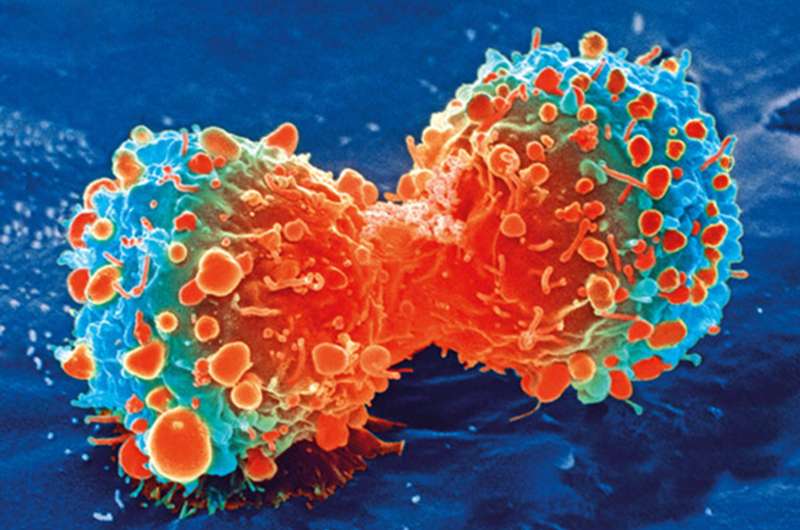
A new treatment for advanced urothelial cancer was effective with tolerable side effects in an international, multi-center phase 2 clinical trial led by investigators at Weill Cornell Medicine and NewYork-Presbyterian.
The trial results prompted a U.S. Food and Drug Administration (FDA) accelerated approval of the treatment on April 13, giving patients with this very aggressive type of cancer a new therapeutic option.
In the study, published online April 30 in the Journal of Clinical Oncology, the researchers gave the treatment, sacituzumab govitecan (SG), previously known as IMMU-132 and now by the trade name Trodelvy, to 113 patients with advanced urothelial carcinoma, the most common type of bladder cancer. The trial population had progressed despite treatment with platinum-based chemotherapy and immune-boosting checkpoint inhibitors, and overall had a median of 3 prior lines of therapy. Treatment with SG was followed by sustained reductions in tumor size for 31 patients (27 percent), including complete tumor disappearance in six patients. The most common severe side effects included very low white blood cell count in 34 percent (with fever in 10 percent) and severe diarrhea in 9 percent, which were managed with dose adjustment and best supportive care.
“The bottom line is that SG represents another option for patients with this aggressive type and stage of cancer—and it’s also nice that it has a different target and mechanism of action compared to other drugs for this indication,” said lead principal investigator of the global trial Dr. Scott Tagawa, a professor of medicine in the Division of Hematology and Oncology at Weill Cornell Medicine and medical director of the genitourinary oncology program at NewYork-Presbyterian/Weill Cornell Medical Center.
Urothelial carcinoma accounts for about 90 percent of bladder cancers and occurs at a rate of about 70,000 new cases and 17,000 deaths per year in the United States. More than three quarters of these cases are in men, and cigarette smoking increases the risk of this cancer by several times.
Advanced urothelial carcinoma, in which the tumor is inoperable or has metastasized, is normally treated with platinum-based chemotherapy drugs, such as cisplatin or carboplatin, and/or immune checkpoint inhibitor drugs that aim to unleash the immune system’s anticancer capabilities. But in most cases, those treatments work for a limited period of time before the disease progresses again.
Sacituzumab govitecan is an antibody-drug conjugate. The drug portion, a chemotherapy agent called SN-38, is attached to an antibody that homes in on a receptor called Trop-2—found on most urothelial carcinoma cells. In this way the drug can aim to specifically kill tumor cells while largely sparing healthy cells.
The company that makes SG was testing it mainly against other cancers, but Dr. Tagawa, who is also a professor of urology and a member of the Sandra and Edward Meyer Cancer Center at Weill Cornell Medicine, and his colleagues showed in a 2015 pilot trial that it shrank tumors in three of six patients with advanced urothelial carcinoma that had not responded to platinum-based chemotherapy. That trial led to the enrollment of a group of 45 patients with treatment-refractory urothelial carcinoma (amongst many others with various advanced cancers) with encouraging results.
In the new phase 2 trial, called TROPHY-U-01 and sponsored by Gilead Sciences, they tested SG in 113 patients with advanced urothelial carcinoma whose cancers had progressed despite platinum and checkpoint inhibitor treatment. The patients, treated at 42 sites around the world, including New York-Presbyterian/Weill Cornell Medical Center and Seattle Cancer Care Alliance, one of the higher accruing sites, received infusions of SG twice every three weeks. Treatment was stopped if tumors grew (progressed) or the side effects became unacceptable.
An independent, blinded analysis of tumor scans revealed shrinkage of tumors in 76 percent of the patients, and an “objective response,” meaning significant, sustained tumor shrinkage, in 27percent of the patients—including the disappearance of tumors in six patients. The median duration of response was 7.2 months, and the median overall survival from start of treatment was 10.9 months.
By contrast, standard cytotoxic chemotherapy for treatment-resistant advanced urothelial cancer in this category has an objective response rate of about 10 percent, with median overall survival of about seven months.
As the TROPHY-U-01 study was ongoing, another antibody-drug conjugate called enfortumab vedotin (EV) was granted accelerated approval by the FDA, with recently published phase 3 trial data that are likely to lead to full approval, according to Dr. Tagawa. The number of patients in the TROPHY-U-01 trial who had been treated with EV was small but showed a similar response compared with the rest of the trial participants. This finding was not surprising given that each therapy has a different target and linker and uses a different toxin to destroy tumors, he said.
Dr. Tagawa cautions that the TROPHY-U-01 trial was a preliminary one that lacked a concurrent control group—every patient was treated—and thus it is hard to compare its results to those for other drugs. He notes, though, that the maker of SG, late last year, began a randomized, controlled, phase 3 trial of the drug comparing it to chemotherapy (TROPiCS-04). The results from that study, due in another few years, will determine whether the FDA grants full regulatory approval.
Source: Read Full Article